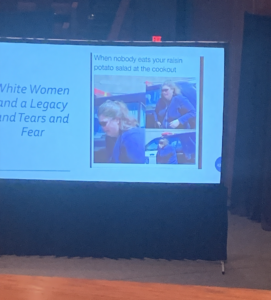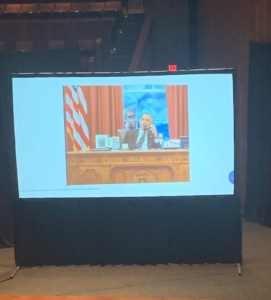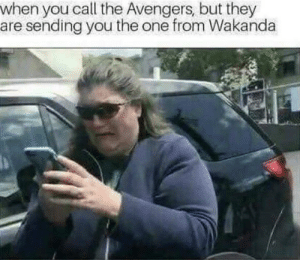Today I was privileged to participate in the Clarke Forum. I have never had a reason to go over my past 2 semesters at Dickinson, so it was nice to do something new.
While I entered ATS and sat down, I was solely focused on relating this presentation to Media and Politics in MENA (Middle East and North Africa). However, what was discussed was somewhat of a mashup between my FYSM class, and the current MENA class.
To give some context – my FYSM class was centered around “Black Horror” – the portrayal of black populations in America across all different types of medium. Originally, it was really just a requirement I had selected because we got to watch a movie during class. However, as most of my graduation requirements end up going, of course I ended up loving it. There is something about taking a class that you don’t “need” to try and perfect, that results in learning the most. By not “having” to stress about a class as some kind of step into a new chapter of organic chemistry or genetics makes it all the more captivating, and more of a personal interest.
Throughout the forum, my past connections and knowledge on media’s portrayals and their historical/political significance really was able to shine through, allowing me to better understand the presentation.
Our presenter for today focused on the commonly known “black twitter”, specifically with regard to “karen” memes. The context of black twitter was touched upon as a social sphere – allowing a collective community (in which virtually anybody could join behind a screen) to voice racial aggressions to a huge audience. These collectively experienced microagressions were made possible through media – video recordings of the police calls made by “karens” and photo/video evidence of situations were posted for the world to see, comment on, and share to other to repeat.
This gave way to a particular type of media: memes.
Memes are extremely prevalent on social media apps today, due to their simplicity, humor, and entertainment. They are rapidly shared, and by using the same format, easy for large audiences to understand. Given their humorous nature, many people on Black twitter who have suffered racial injustice and trauma used this type of humor to cope and spread awareness – seeking change so these actions do not go unchecked.
One particular situation was the focus of tonight’s forum – an incident in which a Black family was having a barbecue in a public park, when a white woman confronted the family and called 911, citing that the family was not allowed to use coal in the public grill, and later called 911 again.
This situation reached Black twitter, and spread like wildfire due to the ability of social media to bounce from one person to another in seconds. Memes can be created in a matter of minutes, and they started to snowball. First from rapid sarcasm, and then eventually reaching for more politically academic topics regarding BLM history and national reception of Black Americans (seen in the two memes below). This illuminated the stereotype of white women harassing Black people under the veil of being upstanding, moral citizens.

A milder meme that included the stereotype of white women putting raisins in potato salad (which not many people like). Made me laugh.

Note the same Karen from this picnic example being shown peering through the window – beginning to touch on relevant political topics that are controversial. This made me laugh harder. I included a similar version below that is less grainy but is the same general concept.


This was one of the last karen memes that we saw regarding this woman who interrupted a family picnic.

one that I looked up myself and found funny
Social media allowed massive communities to spread this information, and with each share, a new idea/comment/concern/personal anecdote could be added, and created what was essentially political art through amusing photos.
It is this social media prevalence that picked up the attention of mass media, which began spreading these stories to a larger audience – people from much different backgrounds, who may have different political views and personal beliefs. This actually created some serious political movements – particularly the C.A.R.E.N Act, in which racially motivated 911 calls are illegal.
A final thing that I found fascinating in the scope of our media class – during the beginning of this presentation, it was touched that media is also looking back at you. Many times, we find ourselves sitting behind the comfort of a screen, or even hiding behind it. The word “panopticon” (a new word for me) was briefly defined. Essentially, in prisons, prisoners do not know when they are being watched and they are not – this creates a culture in which prisoners self govern, and constantly act if they are being watched whether or not they actually are. This creates a feeling of constant stress, as one would naturally feel if they always had somebody “breathing down their neck” and watching their every move.
While this was used as a comparison to give context to the lived experience of Black individuals today, the theory of the “watched” versus the “watcher” is incredibly important when we study media. As we consume media, it is important to remember who we are, who we are watching, who is watching for us, and who is watching us. (or those we are studying).
I will not lie – I had originally only went to this forum with the goal of some extra credit in mind. However, I came out actually enjoying it? It was nothing like the 75 minute lecture I was bracing for. It left me intrigued and hyperfocused on wiki pages regarding “karen phone calls”. I intend on participating in the next clarke forum as well.
September 18th, 2022 at 6:56 pm
I am SO glad you found this presentation stimulating and it has inspired you to think broadly about how ordinary people relate to both social media and mass media. I was only able to attend remotely myself, but I also enjoyed it a great deal.
A lot of what you talk about here can be connected to things we will study in our course. In particular, when we come to think about Syria later in the semester concepts like the panopticon will be very relevant.
You may also find the concept “sousveillance” to be productive. Surveillance is a practice of power, when the powerful watch the less powerful to keep them in line. Sousveillance is a newer word to denote how the less powerful—perhaps using tools like memes and social media—watch those with more power.